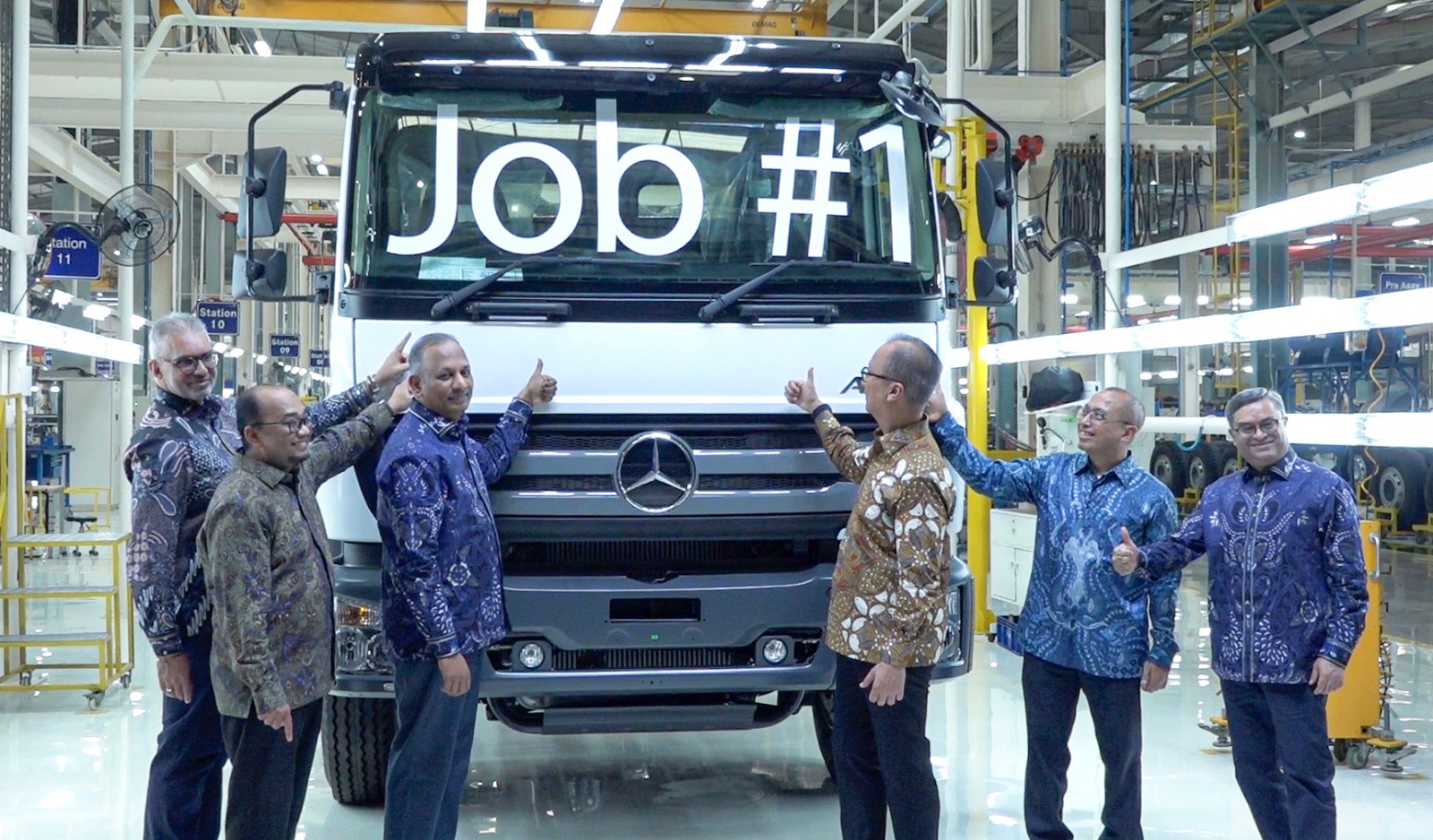Indonesia’s automotive sector remains robust despite ongoing global economic uncertainties.
Several automotive manufacturers are expanding their production capabilities to meet increasing demand both domestically and internationally.
“Many multinational companies, including those in the automotive industry, continue to view Indonesia as a promising location for manufacturing operations,” said Minister of Industry Agus Gumiwang Kartasasmita during the inauguration of PT Daimler Commercial Vehicles Manufacturing Indonesia (PT DCVMI)’s new factory in the Delta Silicon 8 Industrial Estate, Cikarang, West Java, on Tuesday (10/6).
Indonesia as a Strategic Production Hub for Eco-Friendly Commercial Vehicles
This positive trend reflects sustained investment in Indonesia’s automotive sector and reinforces the country’s role as a strategic manufacturing hub, especially in the transition to environmentally friendly vehicles.
“They recognize significant opportunities from Indonesia’s expanding domestic market and its strategic position as an export hub for global markets,” Agus added.
The Ministry applauds PT DCVMI for completing its new factory and Daimler Truck AG for selecting Indonesia as a key production base for Mercedes-Benz buses and trucks in Asia.
“This facility represents a strategic move and a clear commitment by Daimler Truck AG and PT DCVMI to strengthen the Indonesian automotive industry, showing confidence in Indonesia’s potential as a global commercial vehicle manufacturing center,” Agus said.
Production Capacity and Commitment to Environmental Standards
Mercedes-Benz vehicles have been produced in Indonesia since 1978 via PT Star Motor Indonesia, with PT DCVMI established in 2019 to continue this legacy.
The brand remains a major player in Indonesia’s automotive development.
“PT DCVMI can produce up to 5,000 units annually, placing it among the top five commercial truck and bus manufacturers in Indonesia,” the Minister noted, highlighting Mercedes-Benz’s strong market presence.
The Ministry encourages PT DCVMI to focus more on developing green commercial vehicles, aligning with global trends toward electric and clean energy transport.
“Amid global shifts and the push for electric and clean energy vehicles, Indonesia aims not only to be a market but also a key participant in the global supply chain for commercial and environmentally friendly vehicles. We have advanced our manufacturing sector’s Net Zero Emission target to 2050, ten years ahead of the national goal,” Agus emphasized.
To support this, the government will offer fiscal and non-fiscal incentives to accelerate production of green commercial vehicles.
Enhancing Local Content and Export to Reduce Trade Deficit
PT DCVMI’s new factory adopts Euro 4 emission standards using Selective Catalytic Reduction (SCR) technology and Diesel Exhaust Fluid (DEF) based on urea and ionized water.
Agus described this as a positive contribution toward the government’s sustainability goals.
Looking ahead, the Ministry hopes PT DCVMI will develop vehicles meeting Euro 5 and Euro 6 standards to strengthen its domestic and international competitiveness.
Currently, the average local content (TKDN) in PT DCVMI’s products is 28.08%.
Agus stressed that raising TKDN in production and procurement is vital to strengthening the national industry.
“Higher TKDN, achieved through greater local value addition and supply, will improve competitiveness both domestically and for exports,” he said.
From January to March 2025, Indonesia’s commercial vehicle trade balance showed a deficit of USD 608.7 million (IDR 9.7 trillion), with exports of USD 75.5 million and imports of USD 684.2 million.
Increasing local content is a key strategy to address this imbalance.
“We welcome that this new factory’s development aligns with efforts to reduce the national commercial vehicle trade deficit. PT DCVMI plans to maximize this facility to meet domestic demand and boost exports to several countries,” Agus concluded.
Leadership Vision and Economic Impact
Sankaranarayanan Ramamurthi, President Director of DCVMI, said the factory inauguration marks a new phase of growth for the company in Indonesia.
“This factory is more than infrastructure—it embodies our vision to contribute to Indonesia’s economy, empower local communities, and build a stronger industrial ecosystem. Each unit produced represents engineering excellence, teamwork, and our confidence in Indonesia’s future. We are committed to job creation, innovation, and supporting Indonesia’s development,” Ramamurthi said.
Located on 15 hectares, the Cikarang plant represents an investment of IDR 500 billion and underscores Daimler Truck’s commitment to strengthening Indonesia’s commercial vehicle industry.
The facility will continue producing flagship models like the Mercedes-Benz Axor trucks (2528 CH, 4928 T, 4028 T, 4023 T, 2528 RMC, 2528 CX, and 2528 C) and Mercedes-Benz bus chassis (OH 1626 L and OH 1626 S), tailored for the Indonesian market.
PHOTO: KEMENPERIN
This article was created with AI assistance.
Read More






 Friday, 27-02-26
Friday, 27-02-26







